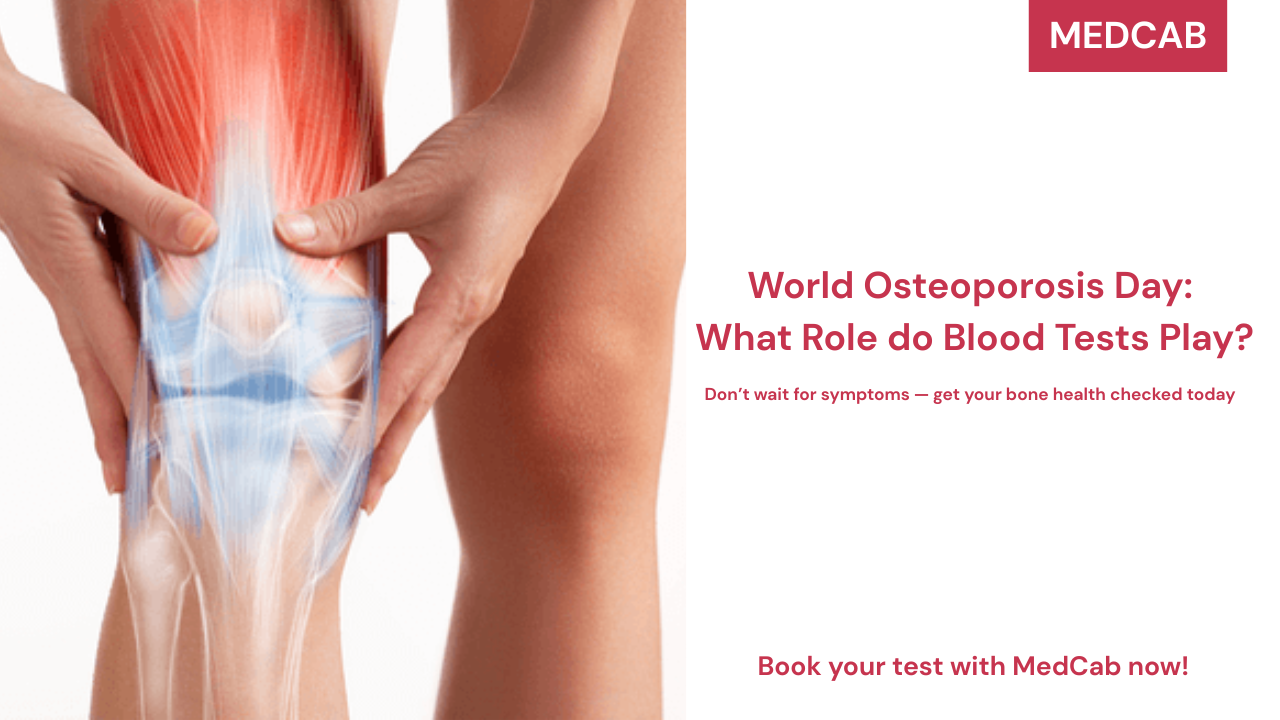World Osteoporosis Day and Blood Tests
Introduction
Osteoporosis is a disease of the bones. It causes the bones to become weak and brittle. In the disease, even minor falls can cause severe fractures due to weakness of the bones. To raise awareness of the disease, October 20th is globally celebrated as World Osteoporosis Day. World Osteoporosis Day aims to create awareness about individuals at risk for Osteoporosis, while highlighting common signs and symptoms of osteoporosis. World Osteoporosis Day is about making the world aware about bone health and taking care of bone health. In this article, learn about Osteoporosis, how blood tests can help with diagnosis and how the disease can be prevented.
Osteoporosis Signs and Symptoms
Osteoporosis is considered a silent disease and has no visible early symptoms. However, there are some common signs and symptoms with the progression of the disease. These severe symptoms can significantly decrease the quality of one’s life. Some of the symptoms are listed below –
Height loss: There will be an evident decrease in height over time.
Brittle nails: Nails may begin to become brittle or have vertical ridges.
Stooped posture: A gradual development of a hunched or stooped back may occur. This can also happen due to vertebral fractures caused by Osteoporosis.
Back pain: Persistent back pain may be caused due to a collapsed vertebra.
Receding gums: Bone loss in the jaw can lead to receding gums and may also be linked to tooth loss.
Shortness of breath: There are cases of osteoporosis where a collapsed vertebra can compress the chest cavity. In turn, lung capacity is affected and shortness of breath occurs.
Fractures: A bone that breaks or fractures from a minor fall or stress.
Weak grip strength: A reduced ability to grip objects tightly is a common symptom. This occurs due to loss of bone mass.
Role of Blood Tests
Getting blood tests is important in cases of Osteoporosis. These are part of the larger assessment, diagnosis and treatment of Osteoporosis and cannot diagnose the disease on their own. Following are the important roles played by blood tests in cases of Osteoporosis –
- Diagnosing Underlying Conditions: Blood tests are required to assess if other health issues are contributing to bone loss, such as hyperparathyroidism (high calcium levels), thyroid conditions, etc.
- Checking for nutrient deficiencies: Vitamin D, calcium and phosphorus tests are important. Vitamin D helps with calcium absorption, while low calcium and imbalanced ratios with phosphorus can affect bone health.
- Measuring bone turnover markers: These tests measure the rate of bone breakdown and formation.
- Bone resorption markers: Tests like urinary N-telopeptide of type I collagen (uNTX) indicate the rate of bone loss.
- Bone formation markers: Other markers include serum procollagen type I N-terminal propeptide (s-PINP).
- Monitoring treatment: Changes in bone turnover markers over time can show how well a treatment is working to slow bone loss.
- Monitoring overall health: Tests like a complete blood count (CBC) can help identify conditions like anaemia that may impact bone health.
Prevention of Osteoporosis
Osteoporosis can be prevented, and the progression of the disease can be significantly slowed through certain lifestyle changes. Certain dietary and lifestyle changes can help in the development of strong bones, thereby preventing falls and fractures associated with Osteoporosis –
- Calcium and vitamin D: One’s diet should include sufficient sources of calcium and vitamin D. These are essential as they help the body with absorption of calcium. Supplements may be necessary in cases of osteoporosis.
- Regular exercise: Engagement in regular physical activity, focusing on weight-bearing exercises like walking, and resistance training to help build and strengthen bones is important. Balance exercises into the routine should also be included. These can help reduce the risk of falls, which can lead to fractures.
- Limit alcohol and quit smoking: Excessive alcohol intake and smoking contribute to bone loss and should be avoided.
- Protein intake: Intake of sufficient protein is important as it helps with bone health.
Blood Tests for Osteoporosis with MedCab
MedCab offers a number of package deals for measuring various types of markers related to Osteoporosis. MedCab provides excellent, rapid sample collection services at budget prices. Our sample collection professional will reach the location of your choosing, be it home or office. Avoid crowded areas and the risk of infections in pathology labs by choosing MedCab’s blood sample collection services from the convenience of your home. Some of the package deals offered by MedCab for include the following –
- MedCab Bone Health Care: package includes a variety of tests such as Alkaline Phosphatase (ALP), Calcium, C-Reactive Protein (CRP) Quantitative, Phosphorus, Rheumatoid Factor (RF), Quantitative test and other 5 parameters.
- MedCab Arthritis Care – Advance: Advance package includes a variety of tests such as CBC Profile, Urine Profile, RBS, LFT, KFT, ESR, CRP, Phosphorus, Rheumatoid Factor, Vitamin B12, Iron Studies, Calcium, Vitamin D test and 75 parameters.
- MedCab Arthritis Care – Basic: Basic package includes a variety of tests such as Anti Cyclic Citrullinated Peptide (Anti CCP) antibodies, CBC Profile, ESR, Kidney Function Test (KFT), Liver Function Test (LFT), Rheumatoid Factor (RF) Quantitative, Vitamin D 25 Hydroxy test and 46 parameters.
- MedCab Bone Health Package: Package includes a variety of tests such as Complete Blood Count (CBC), Vitamin D, Thyroid Stimulating Hormone (TSH), RA Factor, C-Reactive Protein (CRP), Phosphorus Serum, Anti-CCP, Uric Acid Serum, Vitamin B12, Anti-Nuclear Antibody (ANA), Alkaline Phosphatase (ALP), Calcium Serum test and 33 parameters.
Conclusion
In conclusion, World Osteoporosis Day raises significant awareness about the common signs and symptoms of the disease. By knowing the signs and symptoms, one can take quick action and ensure the progression is slowed, while allowing the bones to become stronger through relevant lifestyle changes. Book blood tests with MedCab to review blood markers related to Osteoporosis.
Learn More: https://medcab.in/blog-detail/medcabs-pathology-services-home-sample-collection-made-easy
Download the MedCab mobile App: https://play.google.com/store/apps/details?id=com.medcab.consumer&hl=en_IN






